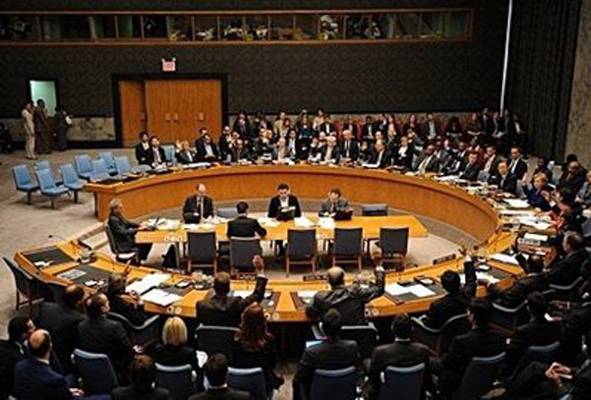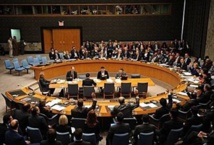In New York, the UN Security Council unanimously adopted a resolution aimed at weakening Islamists in Iraq and Syria by cutting off funding and the flow of foreign fighters.
And EU ministers agreed at an emergency meeting in Brussels to back the arming of Iraqi Kurdish fighters.
The ministers said they welcomed "the decision by individual member states to respond positively to the call by the Kurdish regional authorities to provide urgently military material".
On Maliki's decision to step down, US National Security Adviser Susan Rice said it was "another major step forward" in uniting Iraq, where so-called Islamic States jihadists have snapped up large swathes of land in a lightning and brutal offensive, raising the spectre of genocide.
UN chief Ban Ki-moon also welcomed the divisive Maliki's move and called for the swift formation of "an inclusive, broad-based government ready to immediately tackle these pressing issues".
Support for Maliki's designated replacement, Haidar al-Abadi, has poured in from sources as diverse as Iran and Saudi Arabia.
When jihadist forces launched their offensive on June 9, Kurdish peshmerga forces initially fared better than retreating federal soldiers, but the abandoned US-made weaponry government troops left in their wake turned IS into a formidable foe.
Jihadists advanced within miles of autonomous Iraqi Kurdistan last week, which was one of the factors that triggered US air strikes and broad foreign support for the cash-strapped Kurds.
When the jihadists, who have controlled parts of Syria for months, swept across the Sunni heartland of Iraq in early June, they encountered little or no resistance.
- Sunni tribes rise up -
Maliki's critics say he bears some of the responsibility for the crisis that brought the country to the brink of breakup for pushing sectarian policies that have marginalised and radicalised the Sunni Arab minority.
In another potentially game-changing development, 25 Sunni tribes in the western Anbar province, including some that had previously refused to work with a Maliki-led government, announced a coordinated effort to oust IS fighters.
"This popular revolution was agreed on with all the tribes that want to fight IS, which spilled our blood," Sheikh Abduljabbar Abu Risha, one of the leaders of the fresh anti-jihadist drive, told AFP.
Anbar police chief Major General Ahmed Saddak said security forces were backing the uprising, which began at 6:00 am (0300 GMT) on Friday.
"The battles are continuing until this moment," he said, putting the toll at 12 militants killed and adding: "We will not stop until the liberation of Anbar."
Anbar was the birthplace of a 2006 US-backed uprising against extremist militants that helped bring about a sharp reduction in violence.
- Abadi and Maliki 'alike' -
The decision by Maliki, 64, to turn the page on eight years in power was welcomed across much of Iraq, but some said little will change.
"Maliki stepping down is a positive move to end the crisis," said Baghdad resident Salah Abu al-Qassem.
But the 38-year-old added that Abadi and Maliki are "both from the same school".
"We the Sunnis have been marginalised for 10 years by the Dawa party," said Mohammed Majid, 53, a resident of the city of Samarra, north of the capital.
Maliki, who rose from anonymous exile to become a powerful and feared ruler, said late Thursday he was stepping aside to "facilitate the progress of the political process and the formation of the new government".
US President Barack Obama said a first week of air strikes had broken the siege of a northern mountain where civilians had been hiding from jihadists for more than 10 days.
The US carried out more air strikes on Friday, the military said, destroying two armed vehicles belonging to IS forces.
The mountain ordeal of tens of thousands of people, mostly from the Yazidi minority, was one of the most dramatic chapters of the devastating two-month conflict and another reason Obama ordered air strikes in Iraq, three years after pulling his troops out.
"We helped save many innocent lives," Obama said.
According to the Pentagon, there are still up to 5,000 people on Mount Sinjar, but some of them live on the mountain and may not want to leave.
Thousands of people have poured across a border bridge into Iraq's Kurdish region after trekking through neighbouring Syria to find refuge, many with nothing but the clothes on their backs.
The hundreds of thousands of Yazidis, Christians, Turkmen, Shabak and other people who have been displaced in recent weeks have little prospect of returning home any time soon, but Obama has ruled out US troops on the ground.
---------------------------------------------------------------------------------------------------
And EU ministers agreed at an emergency meeting in Brussels to back the arming of Iraqi Kurdish fighters.
The ministers said they welcomed "the decision by individual member states to respond positively to the call by the Kurdish regional authorities to provide urgently military material".
On Maliki's decision to step down, US National Security Adviser Susan Rice said it was "another major step forward" in uniting Iraq, where so-called Islamic States jihadists have snapped up large swathes of land in a lightning and brutal offensive, raising the spectre of genocide.
UN chief Ban Ki-moon also welcomed the divisive Maliki's move and called for the swift formation of "an inclusive, broad-based government ready to immediately tackle these pressing issues".
Support for Maliki's designated replacement, Haidar al-Abadi, has poured in from sources as diverse as Iran and Saudi Arabia.
When jihadist forces launched their offensive on June 9, Kurdish peshmerga forces initially fared better than retreating federal soldiers, but the abandoned US-made weaponry government troops left in their wake turned IS into a formidable foe.
Jihadists advanced within miles of autonomous Iraqi Kurdistan last week, which was one of the factors that triggered US air strikes and broad foreign support for the cash-strapped Kurds.
When the jihadists, who have controlled parts of Syria for months, swept across the Sunni heartland of Iraq in early June, they encountered little or no resistance.
- Sunni tribes rise up -
Maliki's critics say he bears some of the responsibility for the crisis that brought the country to the brink of breakup for pushing sectarian policies that have marginalised and radicalised the Sunni Arab minority.
In another potentially game-changing development, 25 Sunni tribes in the western Anbar province, including some that had previously refused to work with a Maliki-led government, announced a coordinated effort to oust IS fighters.
"This popular revolution was agreed on with all the tribes that want to fight IS, which spilled our blood," Sheikh Abduljabbar Abu Risha, one of the leaders of the fresh anti-jihadist drive, told AFP.
Anbar police chief Major General Ahmed Saddak said security forces were backing the uprising, which began at 6:00 am (0300 GMT) on Friday.
"The battles are continuing until this moment," he said, putting the toll at 12 militants killed and adding: "We will not stop until the liberation of Anbar."
Anbar was the birthplace of a 2006 US-backed uprising against extremist militants that helped bring about a sharp reduction in violence.
- Abadi and Maliki 'alike' -
The decision by Maliki, 64, to turn the page on eight years in power was welcomed across much of Iraq, but some said little will change.
"Maliki stepping down is a positive move to end the crisis," said Baghdad resident Salah Abu al-Qassem.
But the 38-year-old added that Abadi and Maliki are "both from the same school".
"We the Sunnis have been marginalised for 10 years by the Dawa party," said Mohammed Majid, 53, a resident of the city of Samarra, north of the capital.
Maliki, who rose from anonymous exile to become a powerful and feared ruler, said late Thursday he was stepping aside to "facilitate the progress of the political process and the formation of the new government".
US President Barack Obama said a first week of air strikes had broken the siege of a northern mountain where civilians had been hiding from jihadists for more than 10 days.
The US carried out more air strikes on Friday, the military said, destroying two armed vehicles belonging to IS forces.
The mountain ordeal of tens of thousands of people, mostly from the Yazidi minority, was one of the most dramatic chapters of the devastating two-month conflict and another reason Obama ordered air strikes in Iraq, three years after pulling his troops out.
"We helped save many innocent lives," Obama said.
According to the Pentagon, there are still up to 5,000 people on Mount Sinjar, but some of them live on the mountain and may not want to leave.
Thousands of people have poured across a border bridge into Iraq's Kurdish region after trekking through neighbouring Syria to find refuge, many with nothing but the clothes on their backs.
The hundreds of thousands of Yazidis, Christians, Turkmen, Shabak and other people who have been displaced in recent weeks have little prospect of returning home any time soon, but Obama has ruled out US troops on the ground.
---------------------------------------------------------------------------------------------------









 Home
Home Politics
Politics











